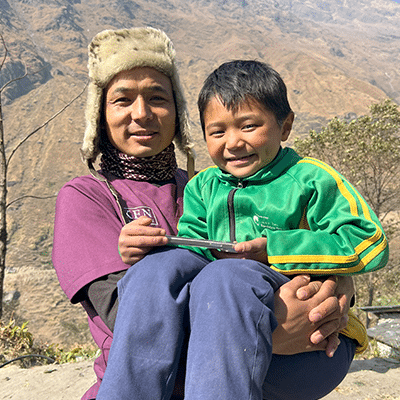
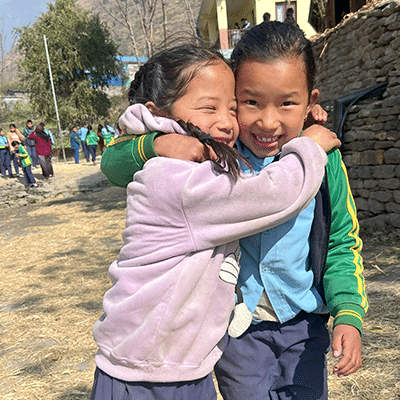
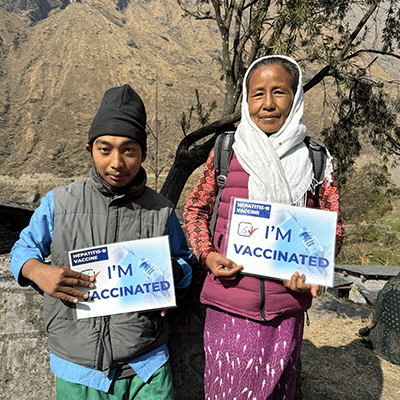
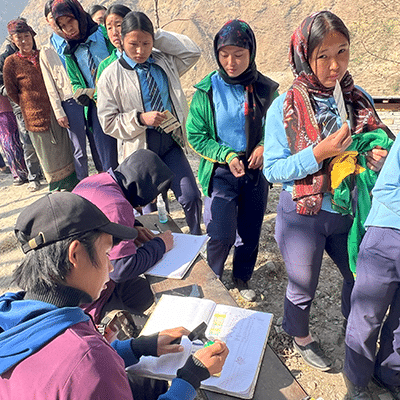
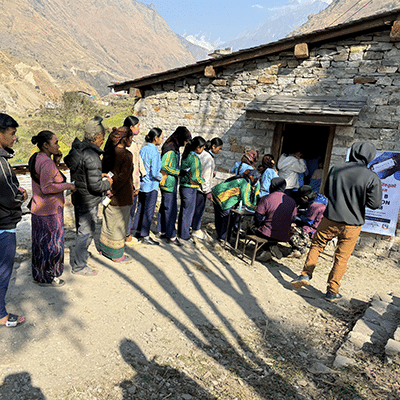
This report provides an overview and evaluation of the 9-day hepatitis B screening and vaccination program conducted (on June 12TH to 21ST) in various rural villages of Sirdibas ward in Tsum-Nubri Rural Municipality. The program aimed to raise awareness about hepatitis B, provide free screening services, and provide vaccinations to eligible individuals. The report outlines the program’s objectives, implementation strategies, outcomes, and recommendations for future initiatives.
The primary objectives of the hepatitis B screening and vaccination program were as follows:
● Identify individuals infected with hepatitis B.
● Educate the rural population about hepatitis B transmission, prevention, and treatment.
● Provide hepatitis B vaccinations to eligible individuals.
● Create awareness about the importance of regular screenings and vaccinations.
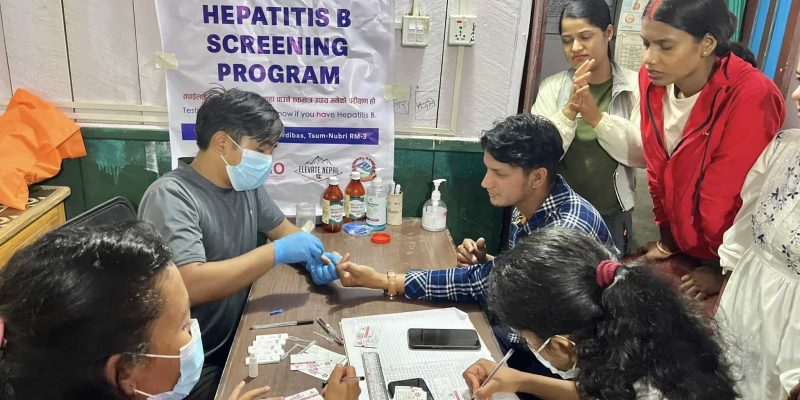
Hepatitis B is a significant public health concern in Nepal, with a long-standing history of the disease impacting the population. Here is a brief overview of the history of Hepatitis B in Nepal:
Early Recognition:
Hepatitis B was first recognized in Nepal as a major health problem in the 1970s. The disease was found to be prevalent in various regions of the country, affecting both urban and rural populations.
Prevalence and Transmission:
Nepal has been classified as an intermediate to high endemic region for Hepatitis B. The prevalence of Hepatitis B surface antigen (HBsAg), a marker of chronic infection, varies across different populations and geographical areas. High-risk groups, such as injecting drug users, healthcare workers, and those with multiple sexual partners, have shown elevated prevalence rates. Hepatitis B is primarily transmitted through exposure to infected blood or other bodily fluids, such as during childbirth, unsafe medical procedures, unprotected sex, and sharing contaminated needles.
Initiatives:
The government of Nepal has recognized the importance of addressing Hepatitis B as a public health issue. Efforts have been made to include Hepatitis B vaccination as part of the national immunization program. In 2003, Nepal introduced the Hepatitis B birth dose vaccination, which involves providing & administering the first dose of the vaccine to newborns within 24 hours of birth. This initiative aimed to prevent mother-to-child transmission and reduce the burden of chronic Hepatitis B infection.
Tsum-Nubri Rural Municipality, which is located in upper Gorkha District, was our program target location. The municipality comprises of seven wards, four in Nubri valley, two in Tsum valley, and the remaining being Sirdibas. Our original plan was to organize the program and cover the whole rural municipality. However, because of the harvest season of Himalayan caterpillar fungus (Cordyceps Sinensis or Yartsagumba), the only sources of financial income for the communities of upper Tsum & Nubri, we organized only in the Sirdibas region. The screening and vaccination program for the remaining wards will be organized in October and November 2023.
Sirdibas, the third ward of the rural municipality, is located at an altitude between 1,500m and 2,000m in the lower part of the rural municipality. The region is ethnically a Gurung community with agriculture and cattle rearing as the main means of subsistence. Jagat, Pati, Sano-Philim, Pangshing, Seyrsong, and Nyak are some of the villages in Sirdibas region.
Generally, people living in the mountains of Nepal face numerous challenges due to the region’s rugged terrain, remoteness, and difficult living conditions. The scenario is worst in Tsum- Nubri Rural Municipality because it is one of the least accessed & developed regions within Nepal.
Preparatory Phase:
We took the following steps to prepare for the program:
• Approached and collaborated with ‘Humanitarian Efforts Reaching Out’ (HERO) and ‘Elevate Nepal’ as a funding partner.
• Collaborated with local rural municipality’s health department, local healthcare authorities, and community leaders to gain support and ensure smooth implementation.
• Conducted a comprehensive training program for locally posted healthcare professionals on Hepatitis B screening and vaccination protocols.
• Used all the connections and available resources like social sites to advertise and inform about the program and its schedule.
• Procured necessary medical supplies, testing kits, vaccines, and educational/ awareness materials.
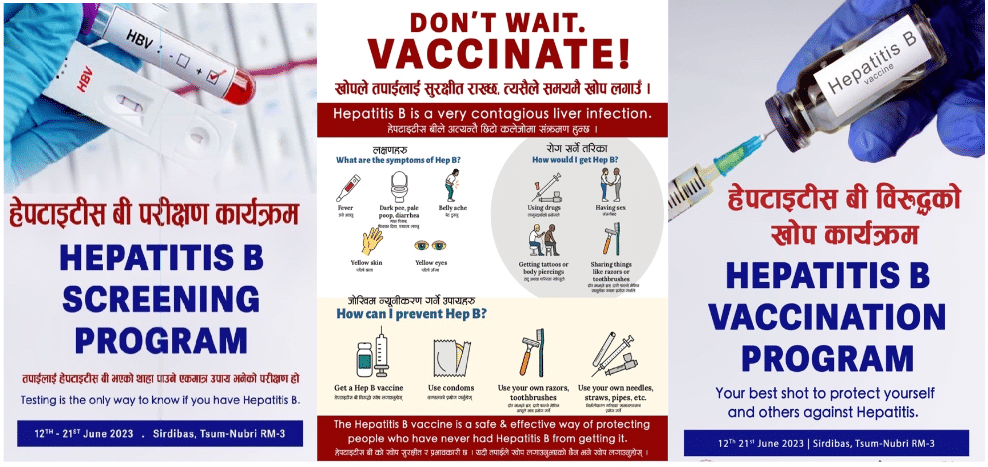
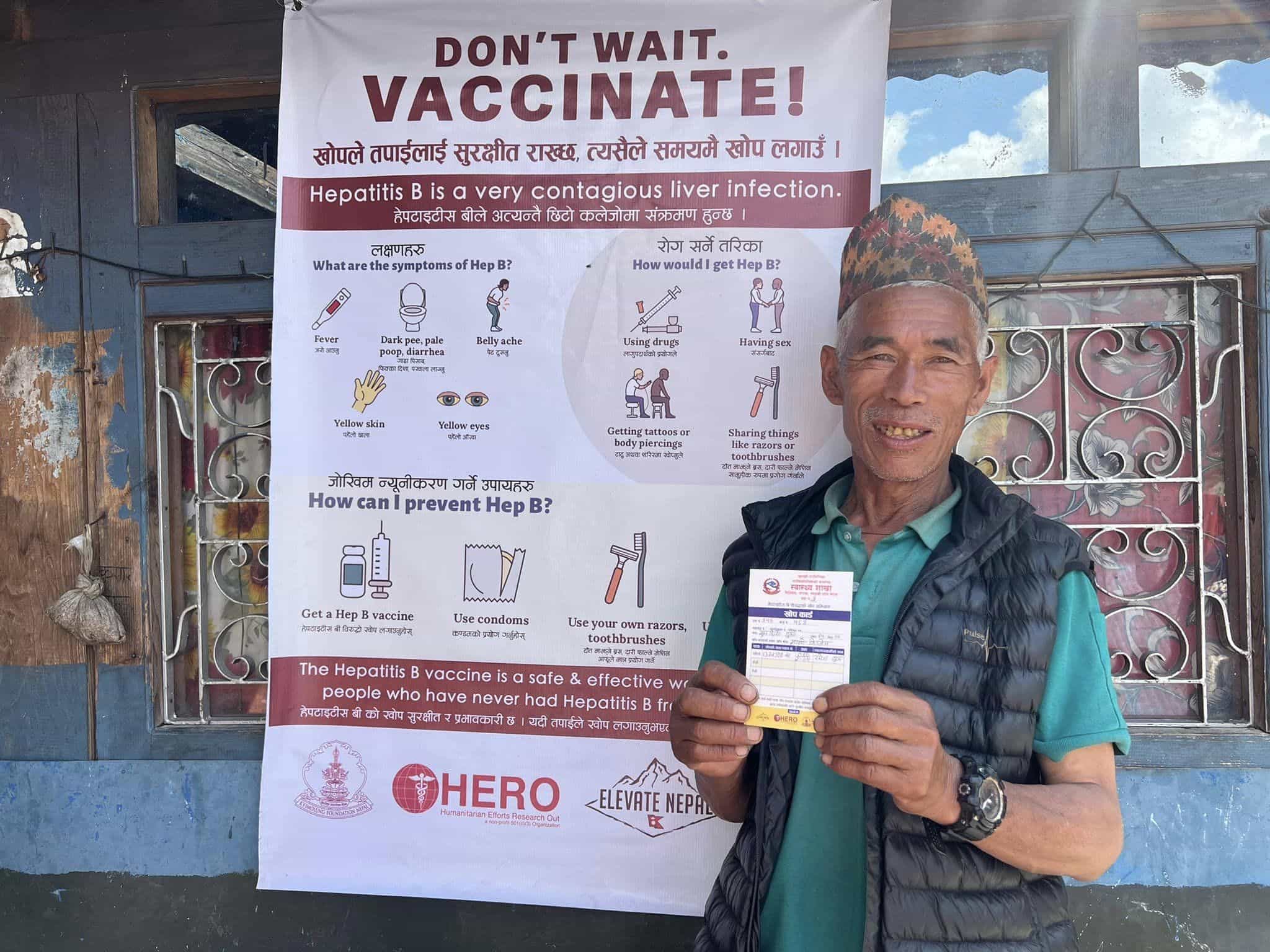
We conducted the following activities as part of the program:
• Established temporary screening and vaccination centers in each rural village, ensuring accessibility and convenience for the local population.
• Conducted community outreach programs, leveraging local networks, and social & online media to create awareness about the program.
• Provided free hepatitis B screening tests to all individuals, followed by counseling sessions to those who tested positive.
• Provided Hepatitis B vaccinations to eligible individuals above 19 years of age, including those who tested negative and those who were not previously vaccinated.
• Distributed educational materials and conducted interactive sessions to promote understanding of Hepatitis B and its prevention.
Screening:
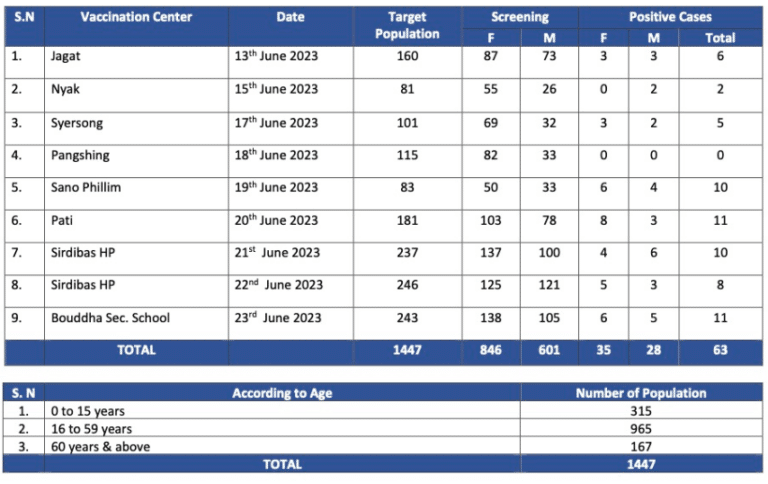
Vaccination:

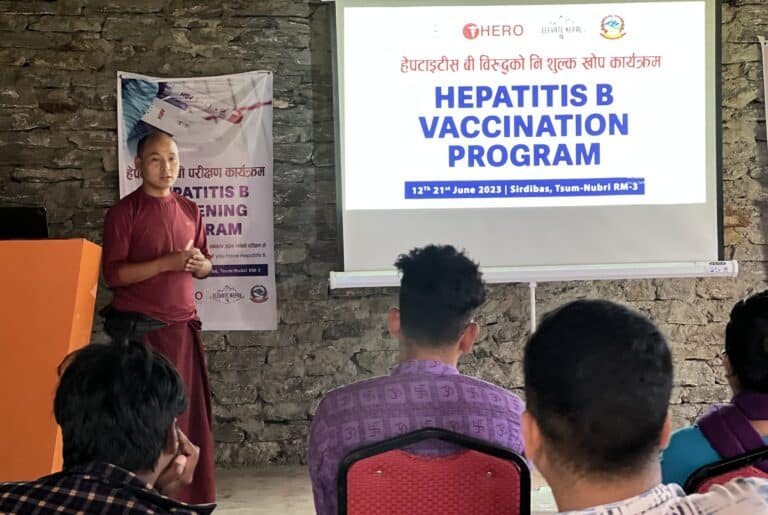
There have been numerous awareness and education campaigns in Nepal to increase public knowledge about hepatitis B transmission, prevention, and treatment. These campaigns have targeted various populations, including schools, communities, healthcare professionals, and high-risk groups. However, given the remoteness, difficult land topography, and isolation of these villages in Tsum-Nubri Rural Municipality, the initiatives from the government have failed to reach these communities.
Non-governmental organizations (NGOs) like ours and international agencies like HERO & Elevate Nepal have played a crucial role in raising awareness, providing education, and organizing screening and vaccination programs in both urban and rural areas.
● Feedback surveys indicated improved knowledge and awareness about hepatitis B transmission, prevention, and treatment among the rural population.
● We noted an increased willingness among participants to undergo regular screenings and encourage others to do the same.
● We witnessed a positive response from community & religious leaders, who pledged continued support for similar initiatives.
Despite these efforts, several challenges persist in the fight against hepatitis B in Nepal. These challenges include limited healthcare infrastructure, especially in rural areas, lack of awareness among the general population, inadequate screening facilities, and accessibility issues.
The public is generally unaware that hepatitis B infection can be prevented with vaccinations and that early diagnosis of a hepatitis B infection can lead to timely initiation of effective treatments. Accessibility and affordability are major barriers, especially for screening, as many people do not have a primary care provider or lack insurance. Stigma and discrimination persist, particularly in several at-risk communities. Social determinants of health, such as lack of access to medical care and psychosocial factors, as well as language, cultural, transportation, and economic challenges represent additional barriers to accessing care.
We faced unprecedented obstacles in reaching remote and isolated communities with our recent program, including challenges in delivering these life-saving vaccines because of the difficult land topography, rugged terrain, and frequent landslides caused by the heavy monsoon. Apart from the abovementioned challenges, our team had to race against time in reaching the vaccines to a particular location because of the availability of only one cooler to store & safeguard the vaccines.
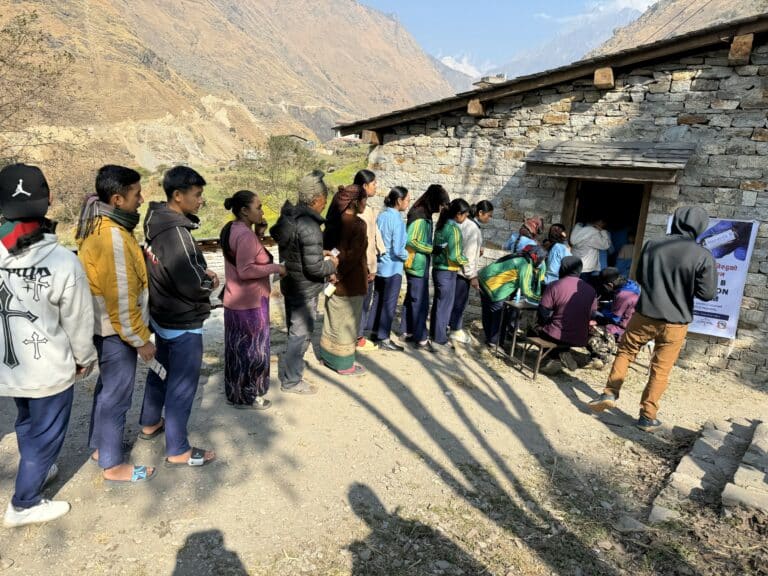
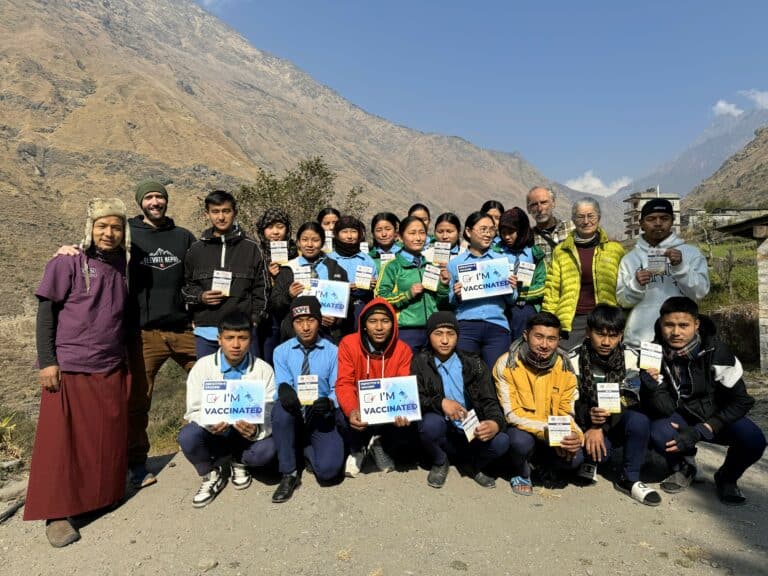
Nepal continues to prioritize the prevention and control of hepatitis B through various strategies, including expansion of the vaccination program, strengthening healthcare infrastructure, and enhancing public awareness campaigns. Collaboration between the government, NGOs, healthcare providers, and communities is crucial for achieving sustained progress in combating hepatitis B.
While the burden of hepatitis B remains a challenge in Nepal, concerted efforts are being made to reduce transmission, increase vaccination coverage, and improve the management and treatment of individuals infected with the virus.
Next steps for our program include:
a. Strengthening collaboration with local healthcare authorities and NGOs for improved planning and coordination.
b. Conducting pre-program community engagement activities to address vaccine hesitancy and misconceptions.
c. Enhancing outreach efforts through mobile healthcare units or satellite clinics to reach remote villages.
d. Training local community healthcare workers to conduct follow-up vaccinations and screenings, ensuring sustainability.
e. Developing sustainable partnerships with local communities, organizations, and government agencies for long-term impact.
The 9-day hepatitis B awareness, screening and vaccination program in Sirdibas successfully raised awareness, identified infected individuals, and provided vaccinations to eligible participants. Despite challenges, the program achieved positive outcomes and laid the foundation for future initiatives. By implementing the recommendations outlined in this report, future programs can further enhance their impact and contribute to the prevention and control of hepatitis B in rural communities.
We appreciate Humanitarian Efforts Reaching Out (HERO) and Elevate Nepal for their continued support with the funding and partnering with us on this much needed program. We would also like to acknowledge the health department of the local rural municipality for their support with the coordination and networks.
A huge THANK YOU goes out to everyone involved.
To view more details about the Hepatitis B Vaccination Program, please download the full report below.